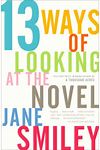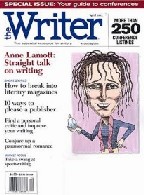See also the pages on the project to write a 50,000-word novel in
November - National Novel Writing Month:
| #.
| Title.
| Material.
|
| 1
| Introduction.
| "I decided to read a hundred novels.
This book is the fruit of that course." [p.13]
|
| 2
| What Is a Novel?
| "A novel is a (1) lengthy, (2) written, (3) prose,
(4) narrative with a (5) protagonist." [p.14]
|
| 3
| Who Is a Novelist?
| "The desire to write a novel is the single required prerequisite for writing
a novel. It is the only thing that overcomes all handicaps — perfectionism, low
self-esteem, depression, alcoholism, diseases of all kinds, immense riches, economic hardship,
deadly enemies, the resistance of relatives and friends, laziness, retarded professional development,
the regular responsibilities of adulthood, even imprisonment." [p.29]
|
| 4
| The Origins of the Novel
| "Although the novel was invented several times — most notably in 1004
by Murasaki Shikibu in what later became Kyoto, Japan, and once again in the thirteenth century
in Iceland, in the form of the Icelandic saga — the modern novel is usually considered
to have originated with Don Quixote." [p.57]
|
| 5
| The Psychology of the Novel
| "The basic substance of imaginative literature (novels, plays, poetry)
is not reason but emotion, which is expressed not by the denotations of words,
nor the grammar of the sentences, but through the connotations and colorations of the words
as employed by the author's style." [p.83]
"The game quality of the novel gives it meaning and form ...
The author sets up the game and is required to signal to the reader early in the narrative
what the rules are." [p.93]
|
| 6
| Morality and the Novel
| "Morality is a perennial gray area in the novel — characters are always doing things
in private that challenges the reader's sense of what is appropriate." [p.105]
|
| 7
| The Art of the Novel
| "Great seminal novelists
... manage to wed originality of technique with depth of insight or breadth of knowledge
or charm or some other quality that demonstrates the value of that technical innovation
and makes it memorable to future novelists." [p. 131]
|
| 8
| The Novel and History
| "Novels are about how people relate laterally to one another." [p.159]
"If I have to pick a single institution that the novel has changed, and whose changes have
in turn fundamentally changed the way people live, I would pick marriage." [p.161]
"The other great subject of the novel ... is 'Who Am I?'." [p.166]
|
| 9
| The Circle of the Novel
| Twelve types of discourse are listed:
- Travel narrative
- History
- Biography
- Tale
- Joke
- Gossip: "public speculation about private matters." [p.180]
- Diary/Letter
- Confession
- Polemic: "rhetorical rather than ... narrative ... uses emotion
... but presents it as argument. The pleasure, for the reader, is
eloquence intensified by feeling and the sense that the writer is
pushing the bounds of propriety." [p.181]
- Essay: "like polemic, uses logic and example to make an argument,
but gets rid of the emotional fervor, adopting instead a reasoned and
objective tone." [p.181]
- Epic: "to solidify a warrior nation's sense of its own identity and
the battle prowess of its warriors." [p.182]
- Romance: "The pleasure of romance comes when the reader recognizes and
sympathizes with the idea that a particular connection between two
characters is interesting, worthy, believable, and involving." [p.182]
"If the reader does not gain the sort of
pleasure she expects from that type of discourse,
she will be disappointed no matter what other pleasures she does gain."
|
| 10
| A Novel of Your Own (I)
| "Chances are, no one wants you to write your novel." [p.204]
|
| 11
| A Novel of Your Own (II)
| "Now that you have felt the profound pleasure of completing your rough draft,
it is time to recognize that there is no technical solution to the problems of
the novel. You can't pick the ideal point of view, the right protagonist,
the ideal plot, or the perfect setting." [p.229]
|
| 12
| Good Faith: A Case History
| She describes the source of the idea for the book, where she got stuck or bored
in writing the novel, and what she learned from her editor (including cutting and reorganization):
"The prose I had already written led me astray and hid the real problems and
their solutions from me ... I finally realized, though, that a book about a scam and
a betrayal has two climaxes: the climax of the action, when big things are
happening and the narrator doesn't know what they mean, and the climax of the
interpretation, when the narrator extracts the real meaning of not only the
climax but also the whole train of events. The problem with my last two chapters
was that these two climaxes were mixed together, so the interpretation stole
the suspense from the action."
I'd attempted and abandoned reading
Good Faith
in 2003.
I was able to finish it in 2007 by listening to a recording of
Good Faith,
and (even though Smiley claims that "the novel was funny"
I found it depressing, with the characters trying to feel good and climb
on the back of the other lemmings in the 1980s real-estate boom.
Also Smiley seemed far too earnest in that book.
|
| 13
| Reading A Hundred Novels
| After "three years of novel reading ... One reason I didn't conceive the list as being
any sort of 'best of' list was that to understand the nature of the novel, sometimes the reader
has to read novels that don't work for her and think about why they don't work." [p.271]
|
| -
| A Hundred Novels. (290 pages)
| For each of a hundred novels that she read in a year,
Smiley gives the title, potted plot, and her critique.
She lists them in the order they were written,
beginning with Marasaki Shikibu's 1004 The Tale of Genji
and ending with Ian McEwan's 2001 Atonement.
Abounding insights include (in this case for the 71st novel in her set:
"The Makioka Sisters [by Junichiro Tanizaki] is a good example of the notion
that a novel does not so much need a plot as an organizing principle." [p.492]
|





 Begin without a plot.
Begin without a plot.
 Begin without characters.
Begin without characters.
 Not finish.
Not finish.
 Not defend your tastes.
Not defend your tastes.
 log of books read
log of books read